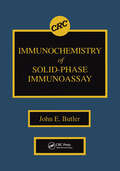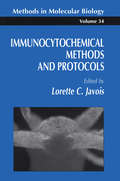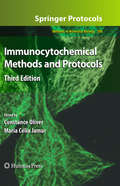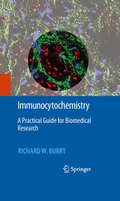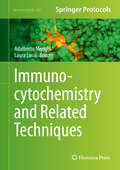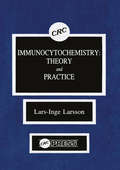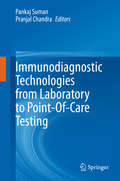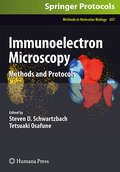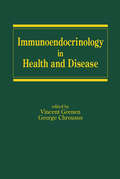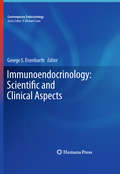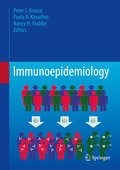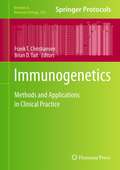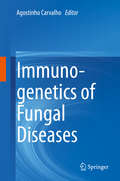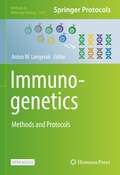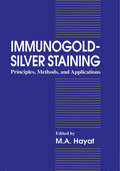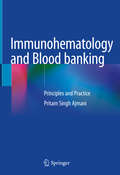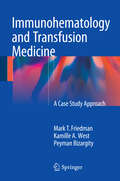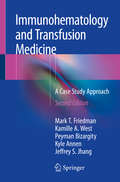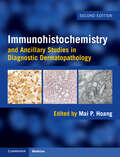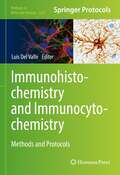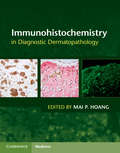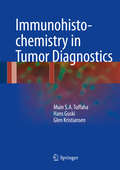- Table View
- List View
Immunochemistry of Solid-Phase Immunoassay
by John E. ButlerImmunochemistry of Solid-Phase Immunoassay fills a niché in the field of immunoassay and immunology. Although solid-phase immunoassay constitutes a major technology in biology and medicine, there is no comprehensive source devoted to the immunochemical principles involved. As a result, this book will benefit students, technicians, and researchers who use this technology, as well as immunodiagnostic and biotech companies who develop the technology. The book is not a methods manual; instead, it incorporates the concepts, data, and opinions of more than 25 investigators working in this field. Topics discussed include: the chemistry of solid-phases, the behavior or antibodies and antigens on solid phases, membrane solid-phases, reaction kinetics, antigen quantitation, enzyme systems, photophysics, immunochemical considerations in data analyses, multianalyte assays and occupancy concepts, antibody quantitation, streptavidin, a review of data analysis software, and solid-phase peptide immunoassay.
Immunocytochemical Methods and Protocols
by Lorette C. JavoisLorette Javois' timely first collection of step-by-step immunocytochemical methods, one that is now used in many biological and biomedical research programs. The methods are designed for researchers and clinicians who wish to visualize molecules in plant or animal embryos, tissue sections, cells, or organelles.
Immunocytochemical Methods and Protocols, 2nd Edition
by Lorette C. JavoisLorette Javois' timely new 2nd edition revises and updates her widely acclaimed collection of step-by-step immunocytochemical methods, one that is now used in many biological and biomedical research programs. The methods are designed for researchers and clinicians who wish to visualize molecules in plant or animal embryos, tissue sections, cells, or organelles. In addition to cutting-edge protocols for purifying and preparing antibodies, light microscopic analysis, confocal microscopy, FACS, and electron microscopy, this revised edition contains many new methods for applying immunocytochemical techniques in the clinical laboratory and in combination with in situ hybridization.
Immunocytochemical Methods and Protocols, 3rd Edition
by Constance Oliver Maria Célia JamurThe landscape of immunocytochemistry has significantly evolved in past years. Once a laborious technique with limited application, the introduction of new detection systems and instrumentation has facilitated the widespread use of immunocytochemical methods. In the post-genomic era, the use of immunocytochemical methods has grown to include the identification of a broad spectrum of antigens including proteins, carbohydrates and lipids from virtually every organism. In Immunocytochemical Methods and Protocols, Third Edition, expert researchers explore the modern methods employed in the field today, now widely used to identify, in situ, various components of cells and tissues in both normal and pathological conditions, and to demonstrate the localization of subcellular components. Chapters provide methods that are designed to be general in their application and to appeal to investigators across all disciplines, including those in research and clinical settings. Composed in the highly successful Methods in Molecular BiologyTM series format, chapters contain a brief introduction, step-by-step methods, a list of necessary materials, and a Notes section which shares tips on troubleshooting and avoiding known pitfalls. Comprehensive and ground-breaking, Immunocytochemical Methods and Protocols, Third Edition, brings together a variety of methods that are normally limited to applications in a specific area, providing a unique and vital guide for researchers and clinicians alike.
Immunocytochemistry
by Richard W. BurryDescription: In biomedical research, because of a dramatic increase in productivity, immunocytochemistry has emerged as a major technique. The proposed book will provide the first practical guide to planning, performing, and evaluating immunocytochemical experiments. In today's graduate education the emphasis is on doing research and not on formal class work. Graduate students therefore lack the background in many essential techniques necessary to perform research in fields in which they were not trained. As director of a university core microscopy facility which sees students and faculty from dozens of laboratories each year, Dr. Burry has surmised the vast majority of these novice microscope users need considerable help. In an attempt to educate users, Dr. Burry has initiated immunocytochemistry seminars and workshops which serve to train people in this powerful research tool. The proposed book is an outgrowth of these presentations and conversations with, by now, hundreds of people who have asked for help. The philosophy which separates this book from other books in this field is that it is practical, rather than academic. In looking at other important immunocytochemistry titles, the predominant orientation is academic, with the author attempting to comprehensively discuss the topic. For example, one book with sample preparation lists ten fixatives which can be used; however, only two such fixatives are commonly used today. In this particular title, the detailed discussion of old methods might be seen as important in establishing the author as an expert. By contrast, the approach for Burry's book would be to discuss methods based on what works in animal research laboratories today, and focus only on the most productive methods. An additional distinction with this proposed book is the focus on animal research and not human pathology. There is a certification program for pathology technicians which requires them to learn a set body of material based on processing human tissue for examination by a pathologist. Many of the books on immunocytochemistry aim at this large pathology user base. Due to historical reasons, pathology laboratories process human tissues in a specific way and embed the tissue in paraffin, as has been done for over a century. In the last ten years, the power of immunocytochemistry in clinical diagnosis has become clear and has accordingly been adapted to pathology. However, the extensive processing needed for paraffin sections is not needed if the tissues are from research animals. Processing for animal-based tissues takes about a third of the time and results in higher quality images. The focus of this book is on processing these animal research tissues for immunocytochemistry. Today, there are no technique books which are aimed at this user base. As a subject matter expert in the area of the proposed book, Dr. Burry will make recommendations and offer opinions. Because this field is new and is emerging, there are numerous advantages of specific methods over other, more generalized methods. The purpose of this book is to show a novice how to do immunocytochemistry without engaging in a discussion of possible advanced methods. For the advanced user, there are several good books which discuss the unusual methods, yet for the novice there are currently none. Main Author : Richard W. Burry, The Ohio State University (United States). The Outline of the Book : Each chapter supplies a set of important principals and steps necessary for good immunocytochemistry. The information is distilled down to include only the most important points and does not attempt to cover infrequently used procedures or reagents. At the end of most chapters is a section on trouble-shooting many of the common problems using the Sherlock Holmes method. Each chapter also includes specific protocols which can be used. The goal of each chapter is to present the reader with enough information to successfully design experiments and solve many of the problems one may encounter. Using immunocytochemical protocols without t...
Immunocytochemistry and Related Techniques
by Adalberto Merighi Laura LossiThis volume presents a collection of protocols for immunocytochemical analysis of neurons and neural networks. Chapters focus on immunocytochemical localization at light and electronic levels, biochemical characterization, and functional analysis in vivo or ex vivo by novel types of microscopy, as well as protocols for development and production of genetic probes. Written for the popular Neuromethods series, chapters include the kind of detail and key implementation advice that ensures successful results in the laboratory. Essential and authoritative, Immunocytochemistry and Related Techniques is intended for a large audience of scientists, including histologists, biochemists, cellular and molecular biologists, electrophysiologists that are currently active in the field or are willing to enter the exciting area of neuroscience research.
Immunocytochemistry of Plant Cells
by Kevin VaughnImmunocytochemistry of plant cells is the first book exclusively dedicated to this topic. The first and largest portion of the book is concerned with a group of proven protocols and variations on these protocols that might prove useful, many developed or modified in the author's laboratory. The second portion of the book covers the studies that have been published previously on each of the plant organelles. Numerous state of the art micrographs from researchers around the world are included to demonstrate typical results.
Immunocytochemistry: Theory and Practice
by Lars-Inge LarssonA complete and balanced overview of all aspects of immunocytochemistry is presented providing a clear understanding of their impact on experiment. All available techniques and many diagnostic and research applications are included, as well as practical step-by-step instructions for carrying out recommended methods. Intended for the novice as well as the experienced researchers.
Immunodiagnostic Technologies from Laboratory to Point-Of-Care Testing
by Pranjal Chandra Pankaj SumanThis book presents the timeline of immunodiagnostics evolution, including advancements in immunological/nucleic acid probes, assay design, labelling techniques, and devices for signal transduction and acquisition. In the past few years, enzyme and nanocatalyst-based immune assays have undergone numerous modifications to enhance their sensitivity and potential for automation. Further, to reduce production costs and the use of laboratory animals, engineering small antibodies and nucleic acid probes (aptamers) has become increasingly popular in the development of novel and powerful bioassays. In light of the notable advancements in immunodiagnostics, this book highlights the combined efforts of clinicians, biotechnologists, material scientists, nanotechnologists and basic scientists in a coherent and highly structured way. The book takes readers on the journey of immunodiagnostic technologies, from their introduction to the present.
Immunoelectron Microscopy
by Steven D. Schwartzbach Tetsuaki OsafuneImmunoelectron microscopy is a key technique that bridges the information gap between biochemistry, molecular biology, and ultrastructural studies placing macromolecular functions within a cellular context. In Immunoelectron Microscopy: Methods and Protocols, expert researchers combine the tools of the molecular biologist with those of the microscopist. From the molecular biology toolbox, this volume presents methods for antigen production by protein expression in bacterial cells, methods for epitope tagged protein expression in plant and animal cells allowing protein localization in the absence of protein specific antibodies as well as methods for the production of anti-peptide, monoclonal, and polyclonal antibodies. From the microscopy toolbox, sample preparation methods for cells, plant, and animal tissue are presented. Both cryo-methods, which have the advantage of retaining protein antigenicity at the expense of ultrastructural integrity, as well as chemical fixation methods that maintain structural integrity while sacrificing protein antigenicity have been included, with chapters examining various aspects of immunogold labeling. Written in the highly successful Methods in Molecular BiologyTM series format, chapters include introductions to their respective topics, lists of the necessary materials and reagents, step-by-step, readily reproducible laboratory protocols, and notes on troubleshooting and avoiding known pitfalls. Authoritative and essential, Immunoelectron Microscopy: Methods and Protocols seeks to facilitate an increased understanding of structure function relationships.
Immunoendocrinology in Health and Disease
by Vincent GeenenOne of the first comprehensive references dealing specifically with this new field of interdisciplinary research in medicine, Immunoendocrinology in Health and Disease offers a full scientific picture of where the immune and neuroendocrine systems intersect-placing current understanding of system components, mechanisms, and functions side by side w
Immunoendocrinology: Scientific and Clinical Aspects
by George S. EisenbarthImmunoendocrinology is a rapidly developing field of research that seeks to understand the intersection of the immune and endocrine systems. Immunoendocrinology: Scientific and Clinical Aspects explores in detail the current knowledge of immunoendocrinology, namely endocrine disorders produced by disorders of immune function. Chapters cover both basic pathophysiology informed by studies of animal models as well as current understanding of multiple related clinical diseases--their pathophysiology, diagnosis, and therapy. Immunoendocrinology: Scientific and Clinical Aspects captures the central role of immunoendocrinologic processes in the pathogenesis of not only type 1 diabetes but in a range of other autoimmune and endocrine disorders.
Immunoepidemiology
by Peter J. Krause Paula B. Kavathas Nancy H. RuddleThis textbook focuses on the nascent field of Immunoepidemiology that addresses how differences in immune responses among individuals affect the epidemiology of infectious diseases, cancer, hypersensitivity, and autoimmunity. The idea for the book originated from a course entitled “Immunology for Epidemiologists“ at the Yale School of Public Health. While many fine textbooks are available that address the immunological responses of individuals to pathogens, these provided very little information regarding how immunological variation among populations affects the epidemiology of disease. And yet, it has long been recognized that there is great immunologic diversity among people, which can have a profound effect on the epidemiology of disease. Careful review of the immunologic and epidemiologic literature revealed that there have been relatively few publications concerning immunoepidemiology and that no textbook is available on the subject. This textbook therefore aims to fill this void by providing a much-needed tool to comprehensively and efficiently teach immunoepidemiology. The book includes a section on the basic principles of immunology, and then applies them to particular examples of disease in human populations. The target audience for this text book are Masters of Public Health students. Others who should also find it of interest include PhD students in epidemiology, immunology, medical students, generalists, and specialists in immunology, infectious diseases, cancer, and rheumatology.
Immunogenetics
by Frank T. Christiansen Brian D. TaitThe HLA molecules are important regulators of the immune response through mediating antigen presentation and interaction between key immune mediating cells. They are also the major histocompatibility barriers to transplantation, which is the clinical paradigm of the self versus non self concept. It is now recognized that this diverse range of gene systems involved in the control of the immune response have been shown to be important in many aspects of clinical practice. As a result many new molecular and cellular methods have been developed for identifying these genes and their polymorphisms, and immunogenetic laboratories specializing in these methods have developed to support transplantation and other clinical programs. Immunogenetics: Methods and Applications in Clinical Practice focuses on methods for human clinical practice. The emphasis rests on those assays which are of established or potential clinical utility and are likely to be included in the repertoire of tests provided by a routine diagnostic and service laboratory. This volume also contains several review chapters of the MHC complex, the KIR complex, the human immunoglobulin allotypes, as well as reviews of the methods for the detection of alloreactive NK cells and the detection of HLA antibodies by solid phase assays. Written in the successful Methods in Molecular BiologyTM series format, chapters include introductions to their respective topics, lists of the necessary materials and reagents, step-by-step, readily reproducible protocols, and notes on troubleshooting and avoiding known pitfalls. Authoritative and easily accessible, Immunogenetics: Methods and Applications in Clinical Practice seeks to serve both the immunogenetics community and the wider scientific community with a collection of detailed information and helpful tips attained by many years of experience in the field.
Immunogenetics of Fungal Diseases
by Agostinho CarvalhoThis book provides up-to-date information on immunogenetics of fungal diseases in the context of primary and acquired immunodeficiencies. Different aspects of this emerging field are covered, including epidemiology of fungal diseases, innate and adaptive antifungal immunity, and the role of immunogenetics in defining susceptibility to fungal diseases in primary (CMC, CGD, etc. ) immunodeficiencies and hematologic patients. The available information will also be discussed in the scope of new biomarker discovery and development of immunotherapeutic approaches for personalized diagnostics and therapy. The book addresses Professors, researchers and advanced students of Medicine, Immunology, Microbiology and Genetics.
Immunogenetics: Methods and Protocols (Methods in Molecular Biology #2453)
by Anton W. LangerakThis open access book explores techniques for working in the field of immunogenetics, i.e. fundamental and translational research into the adaptive immune receptor repertoire. Many chapters are dedicated to lab protocols, bioinformatics, and immunoinformatics analysis of high-resolution immunome analysis, exemplified by numerous applications. Additionally, the newest technological variations on these protocols are discussed, including non-amplicon, single-cell, and cell-free strategies. Written for the highly successful Methods in Molecular Biology series, chapters include introductions to their respective topics, lists of the necessary materials and reagents, step-by-step, readily reproducible laboratory protocols, and tips on troubleshooting and avoiding known pitfalls. Authoritative and practical, Immunogenetics: Methods and Protocols covers a broad spectrum of methodologies for applications in research and clinical diagnostics to illustrate the impact that immunogenetics has achieved and will further expand in all fields of medicine, from infection and (auto)immunity, to vaccination, to lymphoid malignancy and tumor immunity.
Immunogold-Silver Staining: Principles, Methods, and Applications
by M. A. HayatThis book discusses the principles, methods, and applications of immunogold-silver staining (IGSS) to biomedical areas. It focuses on the latest advances in the dynamic and progressive field of IGSS.
Immunohematology and Blood banking: Principles and Practice
by Pritam Singh AjmaniThe book covers the basics of genetics and immunology, technical aspects of blood banking and transfusion.It offers a concise, and practical approach for different blood tests and guidelines on the best ways to take donor history, screen donors, store blood components, ensure safety, and anticipate the potentially adverse effects of blood transfusion, components and its management at the bedside. Different chapters include important topics such as collection, storage and transportation of blood, introduction to blood transfusion, blood group serology, discovery of blood groups, donor selection, interview, and its preparation, and storage, pretransfusion testing, transfusion therapy, clinical considerations, and safety, quality assurance, and data management developed specifically for medical technologists and resident doctors. The book also goes beyond preoperative patient blood management, with detailed accounts of coagulation disorder management and the administration of coagulation products and platelet concentrates. The book also defines the components of a learning health system necessary to enable continued improvement in trauma care in both the civilian and the military sectors. This book offers a succinct and user-friendly resource with key points, boxes, tables & charts and is a quick reference guide for pathology and transfusion medicine residents and doctors in blood centers and hospitals dealing with regulatory aspects, transfusion safety, production and storage and donor care.
Immunohematology and Transfusion Medicine
by Mark T. Friedman Kamille A. West Peyman BizargityThis volume is a collection of immunohematology and transfusion medicine cases, comprised of clinical vignettes and antibody panels with questions based on each case, arranged in a workbook format. The cases are based on real patient problems which are typically encountered and covers a number of common issues and challenging problems in blood banking and transfusion practice. Discussion and resolution of each case is provided in a separate answer section, including up-to-date information on pertinent advances in the field. Written by experts in the field, Immunohematology and Transfusion Medicine: A Case Study Approach provides an interactive tool to help make blood banking and transfusion medicine memorable, practical, and relevant to residents and fellows.
Immunohematology and Transfusion Medicine: A Case Study Approach
by Mark T. Friedman Kamille A. West Peyman Bizargity Kyle Annen Jeffrey S. JhangThe latest edition of this volume features an extensively revised and expanded collection of immunohematology and transfusion medicine cases, comprised of clinical vignettes and antibody panels with questions based on each case. Arranged in a workbook format, the text presents cases based on real patient problems that are typically encountered and covers a number of common issues and challenging problems in blood banking and transfusion practice. Discussion and resolution of each case is provided in a separate answer section, including up-to-date information on pertinent advances in the field. This second edition also contains new cases on topics not previously covered, including types of compatibility testing, polyagglutination, hematopoietic stem cell transplantation, immunohematology test drug interference, granulocyte transfusion, heparin-induced thrombocytopenia, and the approach to the bloodless patient.Written by experts in the field, Immunohematology and Transfusion Medicine: A Case Study Approach, Second Edition provides an interactive tool that makes blood banking and transfusion medicine memorable, practical, and relevant to residents and fellows.
Immunohematology, Transfusion Medicine, Hemostasis, and Cellular Therapy: A Case Study Approach
by Mark T. Friedman Kamille A. West Peyman Bizargity Kyle Annen H. Deniz Gur Timothy HilbertThe latest edition of this volume features an extensively revised and expanded collection of immunohematology and transfusion medicine case studies, comprised of clinical vignettes and antibody panels with questions following each case. Arranged in a workbook format, the text presents cases based on real patient problems and covers a number of common issues and challenging problems in blood banking and transfusion practice. Discussion and resolution of each case is provided in a separate answer section, including up-to-date information on pertinent advances in the field. This third edition updates information on existing case chapters and references and adds a variety of new case chapters. The enhanced title of this edition reflects upon the wider array of covered topics, including in-depth case studies of hemostasis and a second section with blood donation and cellular therapy topics. New features include a key to covered topics for each case and a case-difficulty rating scale. Written by experts in the field, Immunohematology, Transfusion Medicine, Hemostasis, and Cellular Therapy: A Case Study Approach, Third Edition is an interactive tool that makes blood banking and transfusion medicine memorable, practical, and relevant to residents, fellows, laboratory technologists, and anyone interested in gaining and updating their knowledge in the field
Immunohistochemistry and Ancillary Studies in Diagnostic Dermatopathology
by Mai P. HoangImmunohistochemistry and ancillary studies play a crucial role in diagnostic pathology. Yet, few books cover their practicality in diagnostic dermatopathology. This book provides a practical guide to the application of rapid and cost-effective immunohistochemistry, as well as ancillary studies including immunofluorescence and molecular studies. With a focus on practicality and bridging knowledge gaps, the book covers helpful diagnostic stains and pertinent ancillary studies, organized by lines of differentiation. Each chapter includes a synopsis of antibodies, immunohistochemical panels, summary tables outlining staining patterns, and case studies. Now in its second edition, this book covers entities based on lineage, including epithelial, adnexal, melanocytic, lymphoid, and soft tissue, and discusses the role of molecular studies in the diagnosis of cutaneous neoplasms and soft tissue lesions. This comprehensive volume is an essential resource for pathologists, dermatopathologists, and residents in pathology and dermatology.
Immunohistochemistry and Immunocytochemistry: Methods and Protocols (Methods in Molecular Biology #2422)
by Luis Del ValleThis volume provides a comprehensive reference guide for researchers to study the applications of labeled antibodies. Chapters guide reader through the theory and practice of immunohistochemistry, immunocytochemistry and immunofluorescence techniques. Written in the highly successful Methods in Molecular Biology series format, chapters include introductions to their respective topics, lists of the necessary materials and reagents, step-by-step, readily reproducible laboratory protocols, and useful tips on troubleshooting and avoiding known pitfalls. Authoritative and cutting-edge, Immunohistochemistry and Immunofluorescence: Methods and Protocols aims to be a useful practical guide to scientists to help further their study in this field
Immunohistochemistry in Diagnostic Dermatopathology
by Hoang Mai P.Rapid and cost-effective immunohistochemistry plays a crucial role in diagnostic pathology. However there are currently very few textbooks dedicated to its role, especially in diagnostic dermatopathology. This comprehensive volume provides a practical guide to the application of immunohistochemistry in dermatopathology and bridges the knowledge gap by updating readers with helpful diagnostic immunostains as well as recently available ones. Organized by lines of differentiation, each chapter includes a synopsis of applicable antibodies, pertinent immunohistochemical panels, summary tables outlining the staining patterns of the entities in the differential diagnosis, and case studies. The twelve chapters cover entities based on lineage including epithelial, melanocytic, lymphoid, adnexal and soft tissue. The role of immunohistochemistry as a screening test for underlying genetic syndromes, immunobullous diseases, detection of infectious agents and therapeutic purpose is also discussed in detail. This is an essential text for pathologists, dermatopathologists and residents in pathology and dermatology.
Immunohistochemistry in Tumor Diagnostics
by Muin S.A. Tuffaha Hans Guski Glen KristiansenThis book offers a comprehensive yet concise overview of immunoprofile of tumors and antibodies used in contemporary surgical pathology, and provides diagnostic algorithms for approaching tumor diagnostics.Immunohistochemistry has become the most important ancillary technique in diagnostic pathology in the last 20 years, and unlike most books on tumor diagnostics, this volume discusses in details immunohistochemical biomarkers, diagnostic approaches and their pitfalls, as well as the immunoprofile of common tumors throughout all systems of human body. With numerous color figures and detailed flowcharts, it appeals to all pathologists be they young residents in training who want a brief introduction to this technique, or specialists in need of a reliable and comprehensive reference resource in tumors diagnostics.
